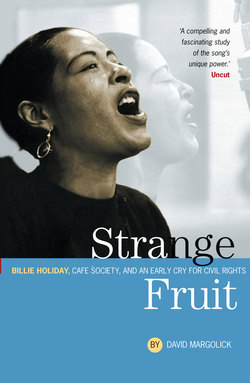Читать книгу Strange Fruit: Billie Holiday, Café Society And An Early Cry For Civil Rights - David Margolick - Страница 12
На сайте Литреса книга снята с продажи.
Оглавлениеtragic story of lynching
One of the first numbers we put on was called “Strange Fruit Grows on Southern Trees,’ the tragic story of lynching. Imagine putting that on in a nightclub!
—Nightclub owner Barney Josephson, 1942
CAFÉ SOCIETY, “a nightclub to take the stuffing out of stuffed shirts,” where left-wing WPA types (Ad Reinhardt, John Groth, Adolph Dehn, Sidney Hoff, William Gropper) did the murals and a simian-looking Hitler hung from the ceiling by the coat check—was unusual even for New York City. Dubbing itself “the wrong place for the Right people,” it mocked the empty celebrity worship, right-wing politics, snootiness, and racial discrimination of popular New York hangouts like the Stork Club.
At Café Society, the doormen wore rags and ragged white gloves and stood by as the customers opened the doors themselves; the bartenders were all veterans of the Abraham Lincoln Brigade; blacks and whites fraternized on stage and off. As one press account described it, the club had “no girlie line, no smutty gags, no Uncle Tom comedy.” George Avakian, the famed record producer, wrote that “the café was one of the ‘good’ places in which Negroes were permitted, and, if possible, given the best tables, while anyone in evening clothes would be placed behind a pillar or almost in the kitchen.” Its politics were somewhere left of the New Deal; when Eleanor Roosevelt made what might have been her only foray into a New York nightclub, it was to Café Society that she went.
Located in a one-time basement speakeasy on Sheridan Square in Greenwich Village, christened by the columnist and playwright Clare Booth Luce, (and commemorated today in the mosaic murals at the nearby subway stop), Café Society was the brainchild of Barney Josephson, a shoe salesman from Trenton, New Jersey with progressive sympathies. Its patrons, the historian David Stowe has written, consisted of “labor leaders, intellectuals, writers, jazz lovers, celebrities, students and assorted leftists.” As Michael Denning, an American Studies professor at Yale has put it, Café Society represented a unique synthesis of cultures, blending the politically radical cabarets ofWeimar Berlin and Paris with the jazz clubs and revues of Harlem. In both its Village incarnation and at a second location in midtown Manhattan, Café Society attracted people like Nelson Rockefeller, Charlie Chaplin, Errol Flynn, Lauren Bacall, Lillian Heilman, Langston Hughes, and Paul Robeson; Lena Horne, Teddy Wilson, Sarah Vaughan, Imogene Coca, Carol Channing, and Zero Mostel performed there. It was probably the only place in America where “Strange Fruit” could have been sung and savored.
